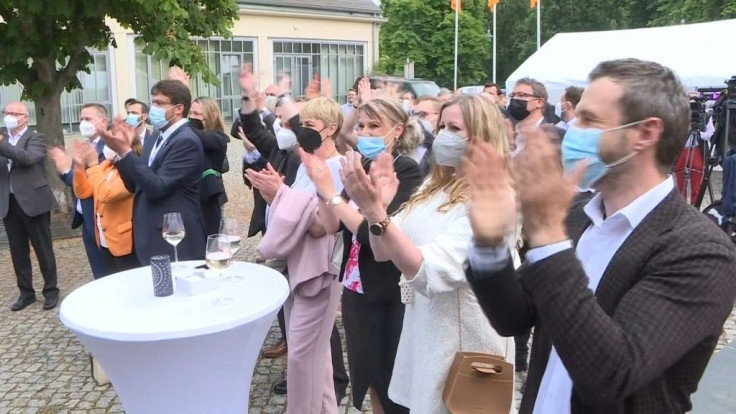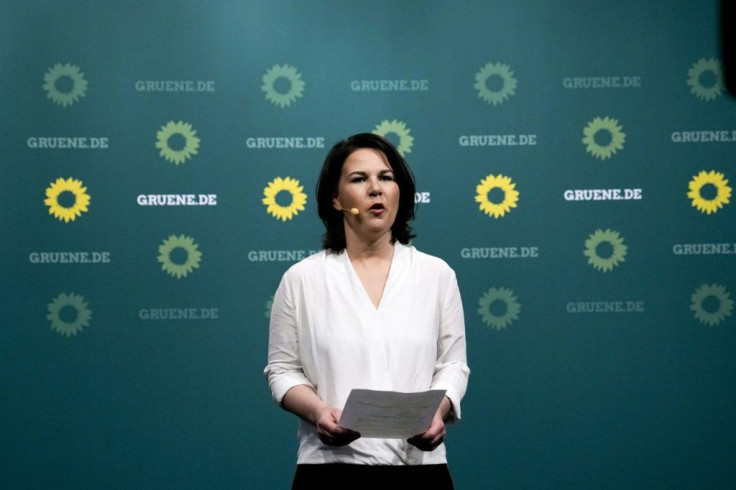Momentum With Merkel Party After Drubbing Far Right In State Poll
German Chancellor Angela Merkel's conservatives on Monday celebrated a thumping win over the far right in the last regional vote before a general election that also exposed the weaknesses of the Greens, their main rivals at the national level.
The Christian Democratic Union (CDU) under new party chief Armin Laschet won around 37 percent of the vote in Saxony-Anhalt on Sunday, preliminary results showed, well ahead of the second place anti-immigration, anti-Muslim AfD party on around 21 percent.
"This is a good day for the CDU and for democracy in Germany," a beaming Laschet told reporters, calling his party a "bulwark against extremism" after polls had predicted a much stronger AfD score.

The Greens, who are running neck-and-neck nationally with the Union alliance between the CDU and its smaller Bavarian CSU sister party, scored a disappointing result of around six percent.
The outcome in the economically depressed former East German state is a huge boost for would-be chancellor Laschet ahead of Germany's general vote on September 26 -- the first in 16 years not to feature Merkel.
"Laschet is still a long way from the chancellor's office," the Sueddeutsche Zeitung daily said. But the poll result has brought him "much closer to it".
Saxony-Anhalt's premier, Reiner Haseloff of the CDU, said the party could carry the momentum from his barnstorming victory into the September poll.

"If the Union is united, it's essentially unbeatable and will be able to provide the next chancellor," Haseloff, who had firmly ruled out any cooperation with the extreme right, told public television.
Berenberg Bank's chief economist Holger Schmieding noted that national polls in the last 10 days have shown the CDU-CSU slightly ahead of the Greens again.
"After the CDU did well in Saxony-Anhalt, this nascent reversal of fortunes in favour of the CDU will likely continue," he said.

Nominated as chancellor candidate in April, Laschet inherited a series of problems including anger over the government's pandemic management and a corruption scandal involving shady coronavirus mask contracts.
At Germany's last regional elections in March -- in Rhineland-Palatinate and Baden-Wuerttemberg -- the CDU suffered its worst-ever results in both states.

Laschet himself has also suffered from weak popularity, following damaging infighting within the Union for the chancellor candidate nomination and his own missteps with pandemic management.
The strife had contrasted starkly with the Greens, who in a show of harmony had nominated Annalena Baerbock as their chancellor candidate.
That had left Laschet trailing behind Baerbock in popularity.
But Spiegel Online said "the voters in Saxony-Anhalt have given Laschet an invaluable gift.
"After his lousy start as chancellor candidate, it was clear that he would not be a man drawing euphoric optimism for his campaign. Rather, the motto was to sit it out," it said.
"What he needs above all is calm, and now he has it."
For the Greens, however, Die Zeit newspaper said Sunday's result "brought them back again to where they often land in eastern Germany: on the ground".
Baerbock's initial national popularity after her nomination had fired up speculation that she could seize Merkel's job from the CDU, and polls ahead of Sunday's vote had predicted the party doubling its share.
She admitted that the Greens' gains in Saxony-Anhalt were "not what we had hoped", acknowledging that "some of our messaging on climate protection failed to cut through to the voters".
The daily Frankfurter Allgemeine Zeitung this week also pointed out inaccuracies in positions listed on her CV, prompting Baerbock to adapt the list on the Greens' website.
The Tagesspiegel daily forecast a rocky road ahead.
Sunday's showing "could be a quiet harbinger that despite all the euphoria surrounding a Green chancellor candidate, the coming weeks could be difficult".
© Copyright AFP 2024. All rights reserved.





















